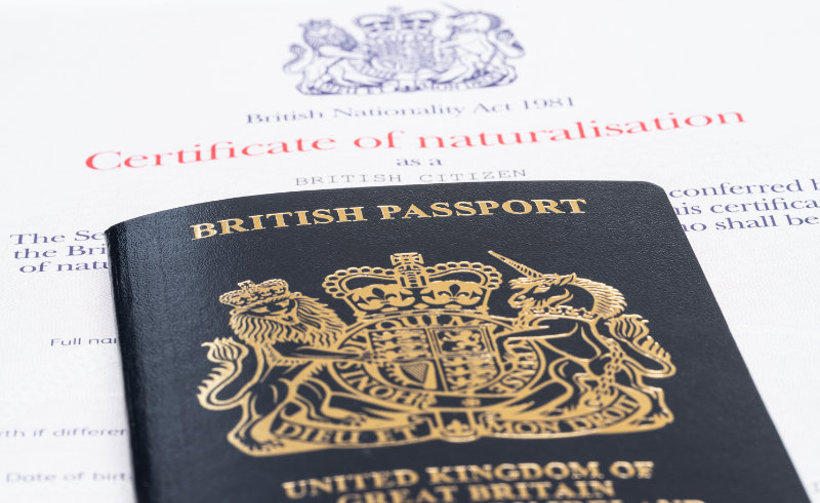
Naturalisation is the means by which most adults become British citizens and is governed by s.6 of the British Nationality Act 1981.
Schedule 1 to the British Nationality Act 1981 sets out the requirements that an application for naturalisation must meet which are that:
- i) an applicant was in the United Kingdom at the beginning of the five years ending with the date of application and that the number of days they have been absent from the United Kingdom does not exceed 450 (this is reduced to three years and 270 days respectively where the applicant is the spouse/civil partner of a British citizen).
- ii) the number of days they were absent from the United Kingdom in the twelve months preceding the date of application must not exceed 90.
- iii) there must be no time restriction on their leave in the twelve months preceding the date of application.
- iv) in the five year (or three year period where the applicant is married to/ in a civil partnership with a British citizen) the applicant must not have been in breach of immigration laws.
- v) the good character requirement must be met
- vi) the applicant has passed the Life in the UK test and the relevant English language test
Should an application for naturalisation be refused then there is no right of appeal and the challenge is by way of judicial review.
The Administrative court in England has recently heard a challenge to a refusal of citizenship based on articles 14 and 8 of the European Convention on Human Rights in the case of R (on the application of Vanriel and Another) –v- Secretary of State for the Home Department [2021] EWHC3415(Admin) Tumi v SSHD judgment (judiciary.uk)
The case concerns two individuals who were excluded from the UK when they were entitled to indefinite leave to remain. The first claimant was a Jamaican national who arrived in the United Kingdom in 1962. As a Commonwealth citizen who was settled in the UK before the 1st of January 1973 he benefitted from the Windrush Compensation Scheme.
This scheme was set up in 2019 following the Windrush scandal when despite having lived legally for a long time in the UK, many of the “Windrush generation” and their family members were told that they were illegally living in the UK and were wrongly detained, deported and denied legal rights.
The applicant had been refused leave to enter the United Kingdom in early 2007 and in late 2008 from Jamaica. In 2018 he made a new application after the Windrush scandal and was granted indefinite leave to remain in November 2019. He was refused citizenship in February 2021 on the basis that the five year rule was not satisfied, namely, that the applicant must be in the United Kingdom at the beginning of the period of five years, ending with the date of application and that the number of days on which he was absent from the United Kingdom in that period does not exceed 450.
The second claimant came to the UK from Ghana in 1964, remained until 1972 and then lived again in the UK from 1980 until 1984, moving to the US with her husband. She was refused entry to the UK in 1986 and then remained in the USA until 2002. She then applied for a visit visa in 2018 which was refused but she was then granted indefinite leave to remain since she fitted the criteria for Windrush treatement. Her application for citizenship was refused in 2020.
The claimants argued that the rigid application of the five year rule decisions were incompatible with rights until Article 14 which prohibits discrimination, and Article 8 which protects the right to respect for a person’s private and family life.
The approach taken by the government in defending this claim relied on its policy which requires citizenship applicants to prove their commitment and connection to the UK and secondly that the state had a wide margin of appreciation in immigration and nationality decisions.
The Administrative court held “it is clear that in cases such as these, the government’s aim of requiring citizenship applicants to prove commitment and connection to the UK could equally as well have been achieved by a less intrusive means” The judge concluded that “the severity of the effects of the treatment outweighed the importance of the government’s objective, even when regard is had to its positive measures for Windrush victims such as the payment of compensation” and that the “application of the five year rule with no discretion or flexibility was incompatible with their rights under Article 14 in conjunction with Article 8.”
The decision reflects the importance of the Human Rights Act 1998 in protecting individuals against the decisions of the state. Lawyers acting on behalf of clients with immigration problems are monitoring closely the “Independent Human Rights Act Review” where the UK government will examine the framework of the Human Rights Act, how it is operating in practice and whether any change is required. The government has recently set out its proposals to reform the Human Rights Act and the proposals can be found here
Nationality Law is a complex area of law and should you have any questions we would be very happy to advise and therefore please do get in touch with either our Glasgow or Edinburgh office.
Take the next step
- Call us on 0131 226 5151
